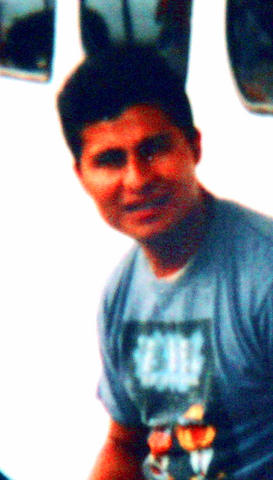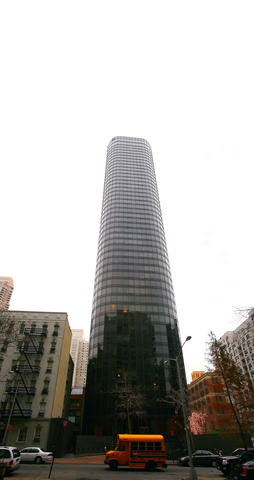Alcides Moreno plunged 47 stories that morning last month, clinging to his 91cm-wide window washer's platform as it shot down the dark glass face of an Upper East Side apartment building. His brother Edgar, who had been working with him on the platform, was killed.
Somehow, Alcides Moreno survived.
He was given roughly 11 liters of blood and 9 liters of plasma and underwent an operation to open his abdomen in the emergency room because, his doctor said, they did not want to risk moving him to an operating room. As December went on, he endured nine orthopedic operations.

PHOTO: NY TIMES NEWS SERVICE
Yet somehow, Alcides Moreno, the man who fell from the sky, survived.
In his hospital room, amid all the machines that helped keep him alive, his wife, Rosario Moreno, lifted his hand again and again to stroke her face and her hair, hoping against hope that a simple tactile sensation would remind him, would help bring him back.
Then on Christmas Day, Alcides Moreno reached out - and stroked the wrong face.

PHOTO: NY TIMES NEWS SERVICE
"Apparently he tried to do it to one of the nurses," Rosario Moreno said on Thursday, describing how she chided him, gently, when she was told what had happened. "I looked at him and said, 'You're not supposed to do that. I'm your wife, you touch your wife.'"
For the first time since the accident on Dec. 7, he spoke.
"He turned around and, in English, said, 'What did I do?'" she said. "It stunned me because I didn't know he could speak."
Surrounded by doctors who had helped save her husband, Rosario Moreno told her story at a news conference at which medical professionals with long years of experience in treating traumatic injuries used words like "miraculous" and "unprecedented" to describe something that seems remarkable: a man who fell nearly 152m into a Manhattan alleyway is now talking and, with a little more luck, a few more operations and some rehabilitation therapy, may well walk again.
"If you are a believer in miracles, this would be one," said Philip Barie, the chief of the division of critical care at New York-Presbyterian Hospital/Weill Cornell Medical Center in Manhattan, where Alcides Moreno, 37, is being treated.
"We are very pleased - dare I say astonished? - at the level of recovery that this patient has enjoyed so far," he added, "and although there is more work to be done, we are very optimistic for his prospects for survival."
Optimistic though they were, the doctors tempered their discussion of Moreno's prospects with some pragmatism. He was to undergo surgery yesterday to stabilize his spine. Sometime after that, he faces another orthopedic operation. Then there will be long months in rehabilitation.
But they predicted that his recovery would be complete in about a year.
Asked at the press conference whether Moreno would walk again, Barie said, "We believe so, yes." He noted that Moreno's pelvis had not been injured in the fall. Barie also said that all the injuries to Moreno's legs - some 10 fractures - had been "repaired" except one.
"Our goal is not just survival, but functional survival," he said.
Still, Barie suggested that Moreno had taken the team treating him into largely uncharted medical territory. Barie said Moreno's medical team had had no experience with someone who had fallen so far. He said that falls from even three stories can be fatal if the victim hits his or her head on landing.
"Above 10 stories, most of the time we never see the patients because they usually go to the morgue," Barie said, though he added that the staff at New York-Presbyterian/Weill Cornell had treated - and had written a medical-journal article about - a patient who survived a 19-story fall, less than half the distance Moreno fell.
"This is right up there with those anecdotes of people falling out of airplanes and surviving, people whose parachutes don't open and somehow they manage to survive," Barie said in an interview after the news conference. "We're talking about tiny, tiny percentages, well under 1 percent, of people who fall that distance and survive."
But Moreno, of Linden, New Jersey, confounded the odds from the beginning. He was sitting up when firefighters arrived at the building, the Solow Tower, at 265 East 66th Street. He was "on the borderline of consciousness" when he was wheeled into the emergency room, Barie said, despite serious injuries to his brain, his spine, his chest and his abdomen, along with several fractured ribs, a broken right arm and two broken legs.
Rosario Moreno said her husband's determination had not vanished that day. "If anything, he keeps me going," she said.
A moment later she added: "He wants to go to rehab. He wants to start walking." She also said she had told him he was not going back to his old job.
"I keep telling him, 'I love you,'" she said at the press conference. A moment later she added, "He keeps telling me it just wasn't his time."
She said their three children - ages 14, 8 and 6 - had visited their father, the two younger children only once. She said she had wanted to show them that "Mommy wasn't lying" and that "unlike Edgar, he's alive." But she said the visit was a particularly emotional moment for her husband because their youngest child, Andrew, "looks just like" Edgar Moreno.
Rosario Moreno said her husband apparently knew all along that his brother had died. She said that she did not tell him, but he mentioned it on Tuesday night. "He doesn't remember much about that day other than his brother passed," she said.
A full explanation for how the man survived, while his brother died, remained elusive. One theory is that Edgar Moreno, 30, was thrown from the platform as it sped toward the ground. One official who was at the scene said that part of Edgar Moreno's body was under the platform when rescuers arrived. But Barie also noted that Alcides Moreno had landed without striking his head.
Rosario Moreno was asked more than once at the press conference why she believed her husband had survived. "He was trained," she said. "He knew what to do with the platform" - meaning, according to other window washers, lie flat and ride it down.
But she also hinted that he was all too aware of the risks of the job. "Even knowing about his brother, not a tear came down, and they were very close," she said. "They lived together. They did everything together."
Rosario Moreno said she did not know if her husband and brother-in-law had been worried about the safety of their scaffold that day. After the accident, another family member who is also a window washer, Jose Cumbicos, said they had mentioned their misgivings in a telephone call that morning. Cumbicos also said that the Morenos' supervisor had reassured them, saying a mechanical problem with their rig had been taken care of.
At least three agencies are investigating the accident.

Dissident artist Ai Weiwei’s (艾未未) famous return to the People’s Republic of China (PRC) has been overshadowed by the astonishing news of the latest arrests of senior military figures for “corruption,” but it is an interesting piece of news in its own right, though more for what Ai does not understand than for what he does. Ai simply lacks the reflective understanding that the loneliness and isolation he imagines are “European” are simply the joys of life as an expat. That goes both ways: “I love Taiwan!” say many still wet-behind-the-ears expats here, not realizing what they love is being an

William Liu (劉家君) moved to Kaohsiung from Nantou to live with his boyfriend Reg Hong (洪嘉佑). “In Nantou, people do not support gay rights at all and never even talk about it. Living here made me optimistic and made me realize how much I can express myself,” Liu tells the Taipei Times. Hong and his friend Cony Hsieh (謝昀希) are both active in several LGBT groups and organizations in Kaohsiung. They were among the people behind the city’s 16th Pride event in November last year, which gathered over 35,000 people. Along with others, they clearly see Kaohsiung as the nexus of LGBT rights.

In the American west, “it is said, water flows upwards towards money,” wrote Marc Reisner in one of the most compelling books on public policy ever written, Cadillac Desert. As Americans failed to overcome the West’s water scarcity with hard work and private capital, the Federal government came to the rescue. As Reisner describes: “the American West quietly became the first and most durable example of the modern welfare state.” In Taiwan, the money toward which water flows upwards is the high tech industry, particularly the chip powerhouse Taiwan Semiconductor Manufacturing Co (TSMC, 台積電). Typically articles on TSMC’s water demand

Every now and then, even hardcore hikers like to sleep in, leave the heavy gear at home and just enjoy a relaxed half-day stroll in the mountains: no cold, no steep uphills, no pressure to walk a certain distance in a day. In the winter, the mild climate and lower elevations of the forests in Taiwan’s far south offer a number of easy escapes like this. A prime example is the river above Mudan Reservoir (牡丹水庫): with shallow water, gentle current, abundant wildlife and a complete lack of tourists, this walk is accessible to nearly everyone but still feels quite remote.